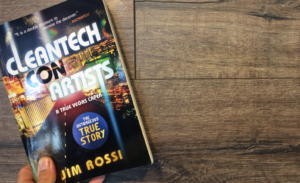Rossi… you magnificent bastard, I READ YOUR BOOK!
Jim Rossi loves him some movie quotes and paraphrases, so please bear with me as I start my review of his new book with one. (Go to the link, and better yet, watch the whole movie. It’s a great one.) Because his repeated use of movie references – even if some were lost on me, since I’ve very rarely been to a theater or seen what’s popular these last couple decades – is one of the many things I like about his Cleantech Con Artists: A True Vegas Caper, the first of what I hope will be many offerings from him.
It’s a ponderous tome. Yes, okay, that’s properly a classic novel reference, but it allowed me to direct you to another fine George C. Scott effort. So sue me. Anyway, Rossi’s book is not a short read. But if you’re like me, it’ll suck you in and the time – and pages – will fly. Parts of it read like a Mickey Spillane novel, and other parts will have you saying to yourself, “Really? That really happened? That’s crazy!” I think my wife and two boys probably thought I was quickly going insane while I read it, because I don’t think I succeeded in keeping those thought entirely in my own head.
That’s because Rossi finds himself entwined in an unfolding big-ass con. You might have gathered as much from the title, but what I found astonishing was how right-in-front-of-his-face it all was. The con artist Rossi ends up exposing was tied to several local initiatives that Rossi was also involved in as part of his work (at least initially) with the University of Nevada, Las Vegas. I gotta say, there were numerous times through the book I started seriously wondering about various people I’m involved with that seem sort of sketchy.
But it’s Rossi’s investigative work that really unmasks the scoundrel – or actually, scoundrels, because while the book is focused on a central sleazebag, he’s surrounded by others who come off as, variously, just as wicked, somewhat wicked, and willing to go along with the wickedness for their own purposes. Be warned: this is not a book that’s going to give you a warm fuzzy about the notion of all people being good at heart. The villains, as it turns out, have long histories of scams, and they’ve hurt a great many people along the way.
(If the book serves no other purpose, it should give you fair warning to watch out for yourselves. Dudes, change your freakin’ passwords!)
On the other side of the moralistic coin, it’s very heartening to read of the staunch support and help Rossi got from his Wolfpack. These are some really good, smart, savvy, and loyal folk. If you don’t have your own Wolfpack, by golly, read about Rossi’s and go start building one. Your life will become infinitely better.
On the third side of that coin (don’t judge; this is my review), Rossi certainly didn’t help turn around my already raving prejudice that a good many of our university administrators should be immediately relieved of duty and put into positions of no authority whatsoever. If you’re a fan of Douglas Adams’s five-book Hitchhiker’s Guide to the Galaxy trilogy (don’t judge – it’s Adams’s trilogy, and that’s how he rolled; RIP), you’ll remember that we learn that earth’s population descended from all the useless people from another world. Telephone sanitizers and the like from planet Golgafrinch, they were fooled into boarding emergency life vessels that were crash-landed here. Our version of those people would, in my estimation, absolutely include some of our university administrators. (The rest of the Golgafrinchans died of a disease from an “unexpectedly dirty” telephone. I doubt we’d find the lack of those particular university administrators anything remotely as negative here.)
But I digress. I already had an affinity with Rossi from our many interactions via LinkedIn, so perhaps that’s why it often felt like this book was aimed at me personally. Rossi is an Eagle Scout (nice work, Jim!); I’m not, but I am a Scoutmaster. Rossi is an avid bicyclist, and so am I. His stories of epic rides on the roads surrounding Las Vegas as well as the mountain bike trails all over the western US have me awfully jealous. He’s an admittedly extremely self-confident and oftentimes contrarian journalist. I’m some of those things some of the time. (Oh, this disclaimer perhaps should have come earlier: Rossi thanks me on his Acknowledgements page as one of his readers on LinkedIn. I am that, for sure. I’ll tell you straight up this has no effect on my judgment of the book, as I was unaware of it until I was nearly finished and already loving it. If you don’t believe me, ask my wife, who was sitting across the room from me when, nearing the end my reading and wondering how quickly (too quickly!) I’d be done, I looked ahead and my own name popped out at me, and I exclaimed, “Hey! My name is in this book!”)
A final interesting element is how the law operates around all this. As he turns up obvious serial law-breaking by his target, Xavier Cross (oh, and Jim, I got the Scrooged reference the very first time that pseudonym popped up – but my wife and I watch that movie every Christmas), Rossi contacts local police and eventually has a visit with the FBI. They do nothing – but in this case, I won’t be critical. Now, I’m a law-and-order kind of guy (here’s one area where Rossi and I differ – I adhere to the Manichean worldview, at least sometimes), but it’s one of the attributes of scum like Rossi’s adversary that they know how to keep the law at bay. Rossi’s dogged pursuit and various personal methods of thwarting the crooks… well, I’ll let you find out for yourself how it all pans out.. But Rossi took care of his own, and that’s as much as anyone can ask of anyone.
Read the book. It’s a whale of a story, which I found intriguing the whole way through. Along the way, I got some excellent movie recommendations (my wife and I greatly enjoyed watching the original Ocean’s 11 right after I finished the book) and some great additions to my reading list. (I’m in the midst of re-reading The Prince right now!) The book begins with a quote from Richard Connell’s The Most Dangerous Game (so I knew I was in for a great tale from the get-go), and has repeated references to that classic battle of wills throughout. Rossi details his use of lessons from other battles of will as well. Jim, I think I’m going to start some family poker games. Thanks.


